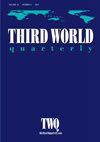The politics around safe zones: a comparative perspective on return to Northern Syria
IF 1.8
2区 经济学
Q2 DEVELOPMENT STUDIES
引用次数: 0
Abstract
Abstract Safe zones, initially established as practical tools for refugee protection, have evolved into diplomatic instruments. Through the case of Northern Syria in a historical-comparative perspective, this article explains the link between border politics and host state-induced return to the safe zones; and questions the viability of return within this politicised environment. Considering the earlier experiences of six cases in Sri Lanka, Iraq, Somalia, Bosnia, Rwanda, and Afghanistan, it shows how safe zones and refugee return have become venues for power struggles, not only between the origin and host states but also amongst regional and global powers; established with respect to their economic, political and strategic interests. The Northern Syrian case is distinguished by Turkey’s pressure for returns during the conflict, which makes conditions for return dependent on Turkish military presence. Without international support or a UNSC decision, Turkey’s self-proclaimed safe zone lacks international legitimacy, and refugee returns remain dependent on unilateral efforts by the Turkish government. Lack of security, rule of law, access to basic services, reconstruction, and overall prospects undermine the feasibility of safe, voluntary and sustainable returns. And as all actors involved place their military objectives above civilian governance, conditions for security in the safe zone remain precarious.安全区周围的政治:回归叙利亚北部的比较视角
安全区最初是作为难民保护的实用工具建立的,现在已发展成为外交手段。本文通过历史比较视角下的叙利亚北部案例,解释了边境政治与东道国重返安全区之间的联系;并质疑在这种政治化环境下回归的可行性。考虑到斯里兰卡、伊拉克、索马里、波斯尼亚、卢旺达和阿富汗六起案件的早期经历,它表明安全区和难民返回已成为权力斗争的场所,不仅在原籍国和东道国之间,而且在地区和全球大国之间;根据其经济、政治和战略利益而建立。叙利亚北部案件的特点是土耳其在冲突期间要求返回,这使得返回的条件取决于土耳其的军事存在。在没有国际支持或联合国安理会决定的情况下,土耳其自称的安全区缺乏国际合法性,难民返回仍然取决于土耳其政府的单方面努力。缺乏安全、法治、获得基本服务、重建和总体前景,破坏了安全、自愿和可持续回返的可行性。由于所有有关行动者都将其军事目标置于文官治理之上,安全区的安全条件仍然不稳定。
本文章由计算机程序翻译,如有差异,请以英文原文为准。
求助全文
约1分钟内获得全文
求助全文
来源期刊

Third World Quarterly
DEVELOPMENT STUDIES-
CiteScore
4.10
自引率
15.00%
发文量
137
期刊介绍:
Third World Quarterly ( TWQ ) is the leading journal of scholarship and policy in the field of international studies. For almost four decades it has set the agenda of the global debate on development discourses. As the most influential academic journal covering the emerging worlds, TWQ is at the forefront of analysis and commentary on fundamental issues of global concern. TWQ examines all the issues that affect the many Third Worlds and is not averse to publishing provocative and exploratory articles, especially if they have the merit of opening up emerging areas of research that have not been given sufficient attention. TWQ is a peer-reviewed journal that looks beyond strict "development studies", providing an alternative and over-arching reflective analysis of micro-economic and grassroot efforts of development practitioners and planners. It furnishes expert insight into crucial issues before they impinge upon global media attention. TWQ acts as an almanac linking the academic terrains of the various contemporary area studies - African, Asian, Latin American and Middle Eastern - in an interdisciplinary manner with the publication of informative, innovative and investigative articles. Contributions are rigorously assessed by regional experts.
 求助内容:
求助内容: 应助结果提醒方式:
应助结果提醒方式:


